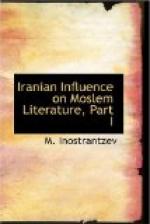This passage the basic principle of which accords with the reflections on religion in our chapter I would now with greater positiveness than before trace to Ibn Moqaffa (ZDMG 59, 803). It did not find a place in the old Pehlevi “Book of Kings” because the latter could recognise only the national religion as the right one and could not have taken into consideration Islam, even supposing that the last redaction of the official Sasanian history took place at a time when Muhammadanism had already come into existence. But Firdausi did not at all invent the material of his narrative. He merely compiled it and the major portion of the compilation goes back to the shape which Ibn Moqaffa had given to the ancient tradition (see what I have to say on this in my National Epic of Iran, Grundriss der iran philogie). In actuality Ibn Moqaffa was not believed to be a sincere Muslim. He is frequently stigmatised as Zindik or heretic (See Aghani 13.81, 18 ff. 18, 200, 25 ff. Ibn Qotaiba, Uyun 71, 9; further Ibn Khallikan 186, p. 125.)
[The term zindiq probably originally denoted a certain rank among the Manichaeians or a similar religion and was then applied to suit a variety of infidels. The etemology, Aramaic Zaddiqy, has been recognised by Bevan.]
Again the passage does not fit in with the tenor of the entire section. For Burzoe who was at a loss with regard to the physician’s art, the main question is, whether he should or should not become an ascetic,—a question which must concern Ibn Moqaffa but little. The suitability of the addenda hardly admits of proof but we may state that Ibn Moqaffa did not simply interpolate but wove them artfully in his text and he might have omitted something here and there.
[Sidenote: Burzoe influenced by Buddhism]
It seems to me highly probable that Burzoe allowed himself to be influenced by the Buddhist romance, the original of which has perished and the best representative of which, is preserved to us in the Arabic Bilauhar wa Budasf (See Barlaam und Joasaph by E. Kuhn). Many a passage of our chapter is strongly reminiscent of the sentences of the romance, for instance, the dangers to the body remind one of those related at p. 53; the four principles or akhalat appear at p. 9, and the parable of the man in the well is common to both. The parable which stands at the close of the chapter is, unless one is greatly mistaken, directly taken from the romance with little modification. It stands in the whole of Kalila wa Dimna isolated, deviates in manner and tendency entirely from the story and also from what has issued from Ibn Moqaffa but is consistent with the monastic predilections of Burzoe. And his appraisement of the life of the recluse does not appear spontaneous but something to which he has laboriously compelled himself. One may surmise that it was really alive only in India. How far it was practised in actual life must remain unproved. We must not omit to mention that Burzoe points out that for an ideal physician his art earns also rich earthly profits.




